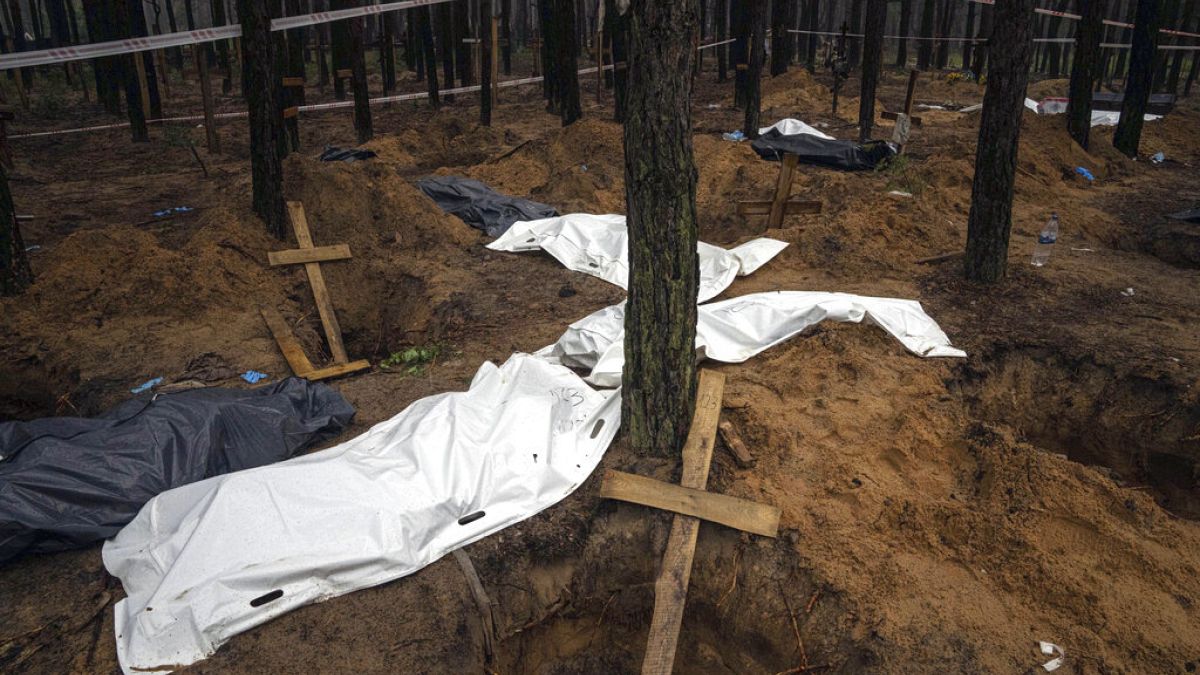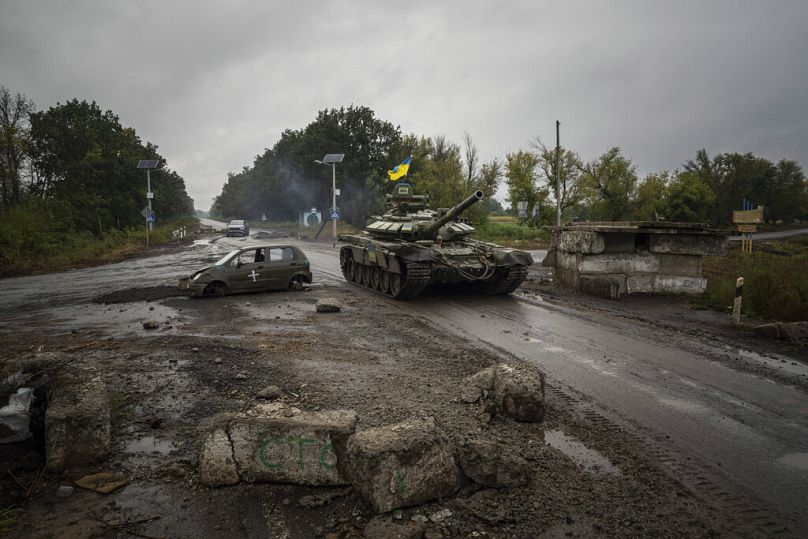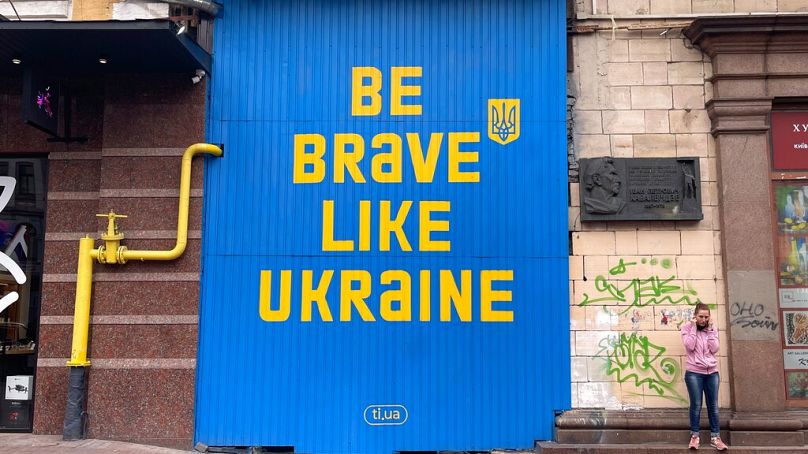These are the latest developments in the Ukraine war you need to know about this Saturday.
1. Russian doubling down after Ukraine advances
Russia's troops are setting up a new defensive line in northeastern Ukraine as Kyiv's troops press on with their offensive.
In a daily intelligence update, Britian's Defense Ministry (MoD) said the line will probably be between the Oskil River and Svatove, some 150 kilometers from Kharkiv, Ukraine’s second-largest city.
"Russia likely sees maintaining control of this zone as important because it is transited by one of the few main resupply routes Russia still controls from the Belgorod region of Russia," the MoD said.
"Russia will likely attempt to conduct a stubborn defence of this area, but it is unclear whether Russia's front line forces have sufficient reserves or adequate morale to withstand another concerted Ukrainian assault," it added.
Russian forces new defensive position comes after a rapid Ukrainian counteroffensive, which punched a hole through the old front line in the war, allowing Kyiv to recaptured large swaths of land in the northeastern Kharkiv region bordering Russia.
Ukraine is continuing to press into territory once held by Russia, having launced the offensive a week ago.
Kharkiv was captured by Russia early on in the war and has remained in Russian hands ever since.
Read more:
2. Izium mass graves: EU presidency wants war crimes tribunal
The Czech Republic, which currently holds the rotating EU presidency, called for an international war crimes tribunal on Saturday, following the discovery of hundreds of tortured bodies in Ukraine.
Around 450 graves were discovered on the outskirts of Izium, a town in eastern Ukraine, recaptured from Russian forces last week.
Nearly all of the bodies showed signs of violent death, while some of those exhumed from mass graves were found with ropes around their neck, according to Ukrainian authorities.
"In the 21st century, such attacks on the civilian population are unthinkable and heinous," Czech Foreign Minister Jan Lipavsky said on Twitter. "We must not ignore it. We are for the punishment of all war criminals."
The minister called for the quick creation of a special international tribunal to investigate this "crime of aggression" and to "prosecute" those responsible.
Russia has denied committing war crimes and targetting civilians in Ukraine.
The Czech Republic, a former communist country, has taken in around 400,000 Ukrainian refugees and provided military aid worth around 150 million euros to Kyiv since the start of the war in February.
3. Poland opens new waterway to break Russia dependence
Poland’s leaders celebrated the opening of a new — albeit unfinished — canal on Saturday, which they say will mean their ships no longer must secure Russia’s permission to sail from the Baltic Sea to ports in the Vistula Lagoon.
The event was timed to mark 83 years since the Soviet invasion of Poland during World War II. It was intended to demonstrate symbolically that Moscow's say over the economy and development of the area, bordering the Russian-controlled Kaliningrad exclave, had ended.
The government says the waterway gives Poland full sovereignty in the northeastern region, which needs investment and economic development.
“The idea was to have this waterway opened and not to have to ask permission anymore from a country that is not friendly and whose authorities do not hesitate to attack and subdue others,” Polish President Andrzej Duda said.
He said the investment will pay off through the increase in the value of the land around it, through the development of the cities and ports on the lagoon thanks to increased trade, business and tourism.
The canal, built at a cost of almost 2 billion zlotys (419 euros), cuts across the Vistula Spit, east of Gdansk, to allow ships to sail from the Baltic Sea to Elblag and smaller ports on the lagoon -- without needing permission to travel through Russia's Strait of Pilawa. It also shortens the Baltic-to-Elblag route by around 100 kilometres.
However, cargo ships cannot use the passage until the approach to the Port of Elblag is deepened to 5 metres. The work is expected to cost 100 million zlotys (20 euros), though there has been some controversy in Poland over the expense of the project.
Read more:
4. Ukraine receives €1.5 billion in new US financial aid
Ukraine's Prime Minister Denys Shmyhal thanked the United States on Saturday for its support after Ukraine received a further 1.5 billion euros in international financial assistance.
"The state budget of Ukraine received a grant of $1.5 billion. This is the last tranche of $4.5 billion aid from the United States from @WorldBank Trust Fund," Shmyhal tweeted.
He said the funds would be used to reimburse budget expenditure for pension payments and social assistance programmes.
Alongside financial aid to keep the Ukrainian state afloat, the US -- along with its western allies -- has provided Kyiv with billions in military assistance.
Since January 2021, the US has committed more than $13.5 billion in security aid to Ukraine, according to the country's department of defence.
The equipment the US provides has changed as the Russian invasion has continued. Originally, the US. provided anti-armour and antiaircraft munitions, including the Javelin and Stinger systems.
After the Ukrainian military drove the Russians back from Kyiv and Russia focused on eastern Ukraine, this changed towards artillery pieces and other crew-served weapons.
5. 'Every minute is too long': Biden meets with families of US captives
US President Joe Biden met with family members of basketball wizz Brittney Griner and Paul Whelan on Friday, in his first face-to-face encounter with their relatives.
In a statement after the meetings, which were held separately, White House press secretary Karine Jean-Pierre said Biden stressed to the families his “continued commitment" to bringing the pair "home safely."
“He [Biden] asked after the well-being of Elizabeth and Cherelle and their respective families during this painful time," Jean-Pierre said. “The President appreciated the opportunity to learn more about Brittney and Paul from those who love them most, and acknowledged that every minute they are being held is a minute too long.”
Negotiations between Russia and the US remain at a standstill and have not reached any breakthrough.
Earlier Friday, John Kirby, a spokesman for the National Security Council, said that Russia has not responded to what he said was a substantial and serious offer from the US to secure Griner and Whelan's release.
“The president is not going to let up,” Kirby told reporters. “He's confident that this is going to remain in the forefront of his mind and his team's mind, and they're going to continue to work as hard as they can.”
Griner has been held in Russia since February on drug-related charges. She was recently sentenced last month to nine years in prison.
Whelan is serving a 16-year sentence on espionage-related charges that he and his family say are false. The US. government says both have been wrongfully detained in what are political cases.
Read more:




